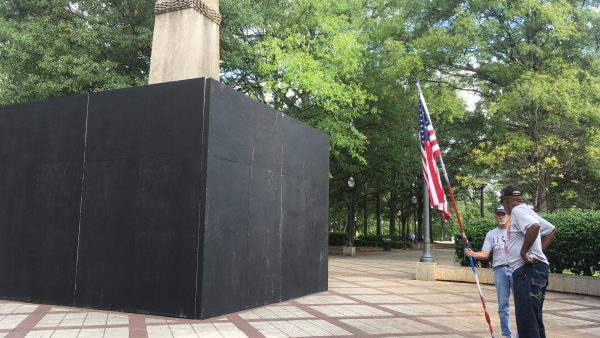High Court Rules Confederate Monument Outside Birmingham City Hall Cannot Be Covered, Fines City
Birmingham Mayor William Bell had the Confederate monument in Linn Park covered after protests in Charlottesville, Virginia, turned violent.
By Sam Prickett
UPDATED — The Alabama Supreme Court ruled Wednesday that the city of Birmingham had violated state law by covering a Confederate monument outside City Hall. The decision reverses a previous ruling by the Jefferson County Circuit Court and orders the city to pay $25,000 in penalties to the state of Alabama.
The monument in question, in Birmingham’s Linn Park, was ordered covered in August 2017 by then-Mayor William Bell following deadly riots surrounding a Confederate monument in Charlottesville, Virginia. The monument, then-City Council President Johnathan Austin contended, “celebrate(s) racism, bigotry, hate and all those things that the South has been known for.”
By covering the monument, Bell said he intended to “challenge” state law, specifically the just-passed Alabama Memorial Preservation Act of 2017, which prohibits local governments from moving or altering historically significant buildings or monuments that are more than 40 years old without permission from the state. The Confederate Soldiers and Sailors Monument was first placed in Linn Park by the Pelham chapter of the United Daughters of the Confederacy in 1905.
By covering the statue with a black plywood screen, which surrounds but does not touch the monument instead of tearing it down, Bell reasoned that the city would still “comply” with the law. But state Attorney General Steve Marshall disagreed, quickly suing the city and arguing that the screen violates the part of the act prohibiting monuments from being “altered” or “otherwise disturbed.”
In Wednesday’s ruling, the state Supreme Court affirmed Marshall’s argument. “The parties agree that the monument in this case was intended as a ‘permanent memorial’ to a group or to military service,” the ruling reads. “However, the monument in its current form — covered by a 12-foot plywood screen around the base — memorializes nothing. Members of the public passing through Linn Park could have no way of knowing what the marble shaft rising from behind the plywood screen was intended to memorialize.”
But the crux of the Supreme Court’s ruling is that, while the city argued that the Alabama Memorial Preservation Act had violated its constitutional rights to free expression, the city actually doesn’t have those constitutional rights, which belong only to individuals.
Rick Journey, Woodfin’s communications director, said in a statement Wednesday afternoon that Woodfin’s office is “strongly disappointed” with the ruling but had not yet decided on a course of action.
“This ruling appears to be less about the rule of law and more about politics,” Journey said. “We are carefully reviewing the opinion to determine our next step, but clearly the citizens of Birmingham should have the final decision about what happens with monuments on Birmingham city grounds.”
Earlier this year, Jefferson County Circuit Court Judge Michael Graffeo ruled that the AMPA violated the city’s right to free speech: “Just as the state could not force any particular citizen to post a pro-Confederacy sign in his or her front lawn, so too can the state not commandeer the city’s property for the state’s preferred message,” he wrote. “A city has a right to speak for itself, to say what it wishes, and to select the views that it wants to express.”
Instead, the Alabama Supreme Court contends, city governments are “mere instrumentalities of the state” which possess “only such powers that have been delegated to them by the Legislature.” Because no individuals were named as defendants to the case except for Mayor Randall Woodfin, who was a defendant only in his official capacity, the court argues that no constitutional rights to free speech have been violated by the AMPA.
The ruling sends the case back to the Jefferson County Circuit Court with instructions to issue an order fining the city $25,000. That’s significantly less than the damages requested by the state, which had amounted to $25,000 per day the monument was covered. That amount would have totalled $20.85 million.
Woodfin’s office has yet to issue a response to the ruling, but representatives have confirmed one is forthcoming.
Trump warns Iran not to retaliate after Ayatollah Ali Khamenei is killed
The Iranian government has announced 40 days of mourning. The country's supreme leader was killed following an attack launched by the U.S. and Israel on Saturday against Iran.
Iran fires missiles at Israel and Gulf states after U.S.-Israeli strike kills Khamenei
Iran fired missiles at targets in Israel and Gulf Arab states Sunday after vowing massive retaliation for the killing of Supreme Leader Ayatollah Ali Khamenei by the United States and Israel.
House Dem. Leader Jeffries responds to air strikes on Iran by U.S. and Israel
NPR's Emily Kwong speaks to House Minority Leader Hakeem Jeffries (D-NY), who is still calling for a vote on a war powers resolution following a wave of U.S.- and Israel-led airstrikes on Iran.
Iran’s Ayatollah Ali Khamenei is killed in Israeli strike, ending 36-year iron rule
Khamenei, the Islamic Republic's second supreme leader, has been killed. He had held power since 1989, guiding Iran through difficult times — and overseeing the violent suppression of dissent.
Found: The 19th century silent film that first captured a robot attack
A newly rediscovered 1897 short by famed French filmmaker Georges Méliès is being hailed as the first-ever depiction of a robot in cinema.
‘One year of failure.’ The Lancet slams RFK Jr.’s first year as health chief
In a scathing review, the top US medical journal's editorial board warned that the "destruction that Kennedy has wrought in 1 in office might take generations to repair."






